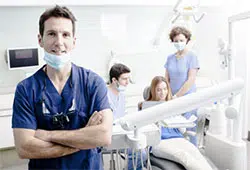No products in the cart.
Infection Prevention and Control
Can wearing a face mask protect you from Coronavirus?
People wearing face masks when they are not in clinical environments is a common sight these days. Air quality in some regions has meant increased use of surgical style face masks in the hope of filtering out pollution.
In dentistry, clinical staff work in close proximity to patients and safety should always be at the forefront of our thoughts and protection from splatter should be part of any infection prevention strategy. Splatter is usually defined as visible particles that are greater than 50µm’s. Also of concern for the dental team are aerosol contaminants generated by high speed dental drills and ultrasonic scalers.
What do you need to know about surgical face masks
Face masks are not all created equal and it is crucial that wearers understand the level of protection, or lack of, offered by each level. When selecting a face mask, particularly in the dental environment, different procedures require varying levels or grades of masks.
In dentistry, we use masks that meet the Australian Standard AS 4381: 2015 Single-use face masks for use in health care. Additionally, we look for ASTM Levels. ASTM Levels refer to an internationally adopted standard from ASTM International. ASTM International tests and develop standards for a wide range of products and materials and other medical products.
The ASTM sets the performance Levels for masks based on specific criteria and test results. From these results the ASTM sets the standard for the types of procedure and application a mask may be suitable for.
In dentistry, a lot of procedures are performed that involve moderate to high levels of aerosol exposure. Based on ASTM Levels a large portion of the procedures undertaken in dental practices require either a Level 2 or Level 3 mask.
Are you wearing your face mask correctly?
There are many factors that can impact the efficacy of a face mask over and above the type of mask selected. Length of wear, fit and articulation all play a part in the level of protection a mask can offer but it will not remove the risk of infection entirely.
Wearing a mask and expecting it to last all day is also unrealistic. Masks will lose their ability to effectively filter once they become damp – either internally from breathing or externally from aerosol contamination. Cross contamination can also occur from touching the exterior of the mask.
In the dental practice, we avoid infection by changing masks after each patient at minimum. In an environment that is aerosol producing for extended periods such as multiple crown preparations or a full mouth ultrasonic scaling it is necessary to change masks more frequently.
For a mask to offer the best protection it must fit the wearer correctly including being articulated across the nasal bridge with the internal wire. The mask must also fit flat against the cheek area to prevent inhalation of aerosols and splatter contamination. This is often not possible with ear loop style face masks in particular as they can pull on the ears which leads to side gaps.
It is important to note that masks are not one size suits all. Tie on masks may adapt to the face better for most wearers. Finally, for correct fit, masks must be fitted correctly under the chin so provide protection for the lower face and upper neck area.
Face masks for viral protection
After the identification of the novel Coronavirus 2019n-CoV and the declaration by the World Health Organisation (WHO) of a global health emergency mass hysteria of mask buying has developed globally. Masks traditionally worn by dental team members as part of Standard Precautions for Infection Prevention and Control are now in short supply as the general public panic buy. Those that rightly or wrongly make the decision to capitalise on public fear are selling masks via online sources for as much as 200% of their usual value.
*1 Carton of Level 3 Face Masks Complimentary On Every Purchase of Infection Prevention And Control Combi Pack
Will masks prevent you from contracting 2019n-CoV?
The factors above directly impact whether a mask will protect you as does your susceptibility to disease. The mortality rate of coronaviruses has typically been low and the newly identified 2019-nCoV can not yet be fully quantified. However, preventing a healthy person from contracting an infectious disease differs from preventing an infected person from spreading an infectious disease.
While the best recommendation for people who are ill and exhibiting respiratory symptoms is to stay home, this is not always practical if doctor visits are required. In these situations the wearing of a face mask is indicated. For healthy people, correct and frequent Hand Hygiene and maintaining a reasonable distance from people with coughs and sneezes should reduce the risk. For health care staff including dental team members, no change should be made to the usual Standard Precaution Policies and Procedures for Personal Protective Equipment applied in your practice.
Supporting information:
Advice on the use of masks in the community, during home care and in health care settings in the context of the novel coronavirus (2019-nCoV) outbreak.
Coronavirus: How worried should I be about the shortage of face masks?
We hope you have a sufficient stock of face masks!
*1 Carton of Level 3 Face Masks Complimentary On Every Purchase of Infection Prevention And Control Combi Pack



 Coaching Solutions
Coaching Solutions














